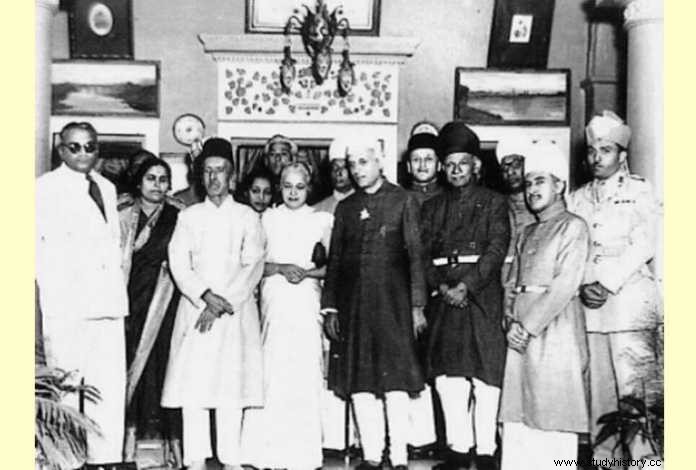
Hyderabad was the second princely state not to be found in India till 15 August 1947. The princely state of Hyderabad was established in AD 1720 by the Mughal Subedar Chinkulij Khan. He assumed the title of Nizamulmulk. For this reason the ruler of Hyderabad was called Nizam. In AD 1798, the princely state of Hyderabad made a treaty of aid (subsidiary alliance) with the East India Company.
The Hyderabad Nizam was given a 21-gun salute by the British government. The area of the princely state of Hyderabad at the time of India's independence was 2,14,190 square kilometers. It was the largest and most prosperous native state of India. It was as big as France in area. The population of Hyderabad state was approximately 1,63,40,000. The territories of the present-day Maharashtra, Karnataka and Andhra Pradesh provinces were located in the state of Hyderabad. Like Junagadh, the ruler of Hyderabad was also a Muslim, but 85 percent of the population of the state was Hindu. ]
Hyderabad state was surrounded by Indian borders on all sides. Osman Ali Khan Asif Jah (VII), the last Nizam of Hyderabad, had 28 sons and 44 daughters. The Nizam was obsessed with collecting gold and diamonds and jewels. Nizam was considered the richest ruler of India. The Nizam considered democracy as a corrupt system and believed in the divine rights of the kings.
The officers of the Nizam were equally cunning and greedy. All the jobs in the state were reserved for Muslims. In 1947, a Legislative Assembly was formed in Hyderabad, in which 48 posts were kept for Muslims and 38 posts were kept for Hindus so that no law can be made which is against the rights of Muslim riyaya. This assembly was given so many powers that even if the Nizam himself wanted, the Muslims could not cut the rights of Riyya.
The Nizam had great faith in the vast territory of his kingdom, the rich wealth, the generations-to-generation relations with the British rulers and the huge army. That is why he wanted to make Hyderabad state an independent country instead of joining India or Pakistan. The Nizam was confident that he would be able to keep Hyderabad independent on the strength of the treaties made from time to time with the East India Company and the British Crown.
When the British Prime Minister Attlee announced the acceptance of the right of self-determination of Indians on 15 March 1946, since then the Nizam started efforts to get his state recognized as an independent nation. The Nizam considered Lord Mountbatten as his friend and was confident that Mountbatten would help the Nizam in getting Hyderabad recognized as a separate Dominion Nation from India and Pakistan.
Seeing Hyderabad behaving like this, Sardar Patel had to say that- 'Hyderabad is like a canker in India's stomach.
On 9 June 1947, the Nizam wrote a letter to the Viceroy Mountbatten in which he openly expressed his disquiet -
'In the last few days, I saw the seventh clause of the Independence Bill as it appeared in the newspapers. I regret that as has often been the case in the past months, the matter was thoroughly discussed with the political leaders and not even shown to them, let alone the representatives of the princely states. It pains me to see that this bill not only unilaterally nullifies the treaties and agreements made with the British Government but also gives the impression that if Hyderabad could not become a part of Pakistan or Hindustan, then it would not be in the British Commonwealth either. Can stay The treaties on the basis of which the British Government had promised to protect my family and this state against foreign invasion and internal rebellion years ago have always been admired and supported. Chief among these is the 1941 promise of Sir Stafford Cripps.
I understood that I could fully trust the British army and promise. I agreed not to increase my army, I agreed not to produce weapons in my factories. And on the other hand, far from our consent, the bill was passed without consulting us or our government. You know that when you were in England, I had demanded that when the British leave India, we should also get the status of a colony. I have always felt that the faithful friendship of over a century, in which we gave all our confidence to the British, would result in enough to allow us to remain in the Commonwealth without question. But now it seems that that too is being denied. I still hope that no conflict will arise between me and the direct relationship between the British Government. Recently I was told that you have taken the burden on yourself that such an announcement will be made in the Parliament to make such relations possible.'
On this the Viceroy Mountbatten informed the Nawab that Hyderabad could not be given the status of a colony as it would be surrounded by a part of the country which would become the enemy in this situation.
